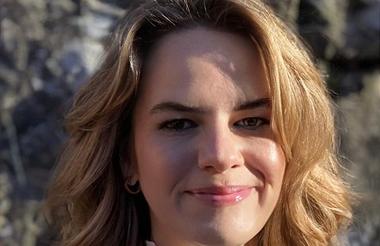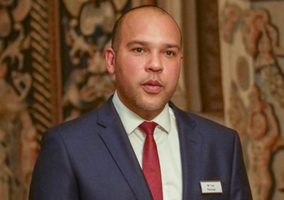In the lead up to this year’s main event, the London Marathon Foundation (LMF)’s executive director Catherine Anderson is focused on boosting the general public’s awareness of her charity.
LMF rebranded from the London Marathon Charitable Trust earlier this year in an effort to help achieve that aim.
But beneath the surface, bigger changes have happened in recent years at the charity, including a governance reorganisation that led to the creation of Anderson’s role in April 2021.
Anderson is used to leading charities through periods of change and growth, having previously been chief executive of the Jo Cox Foundation as its income more than doubled from around £300,000 when she joined in 2018 to about £750,000 when she left.
She has overseen an even sharper increase at her current organisation. After Covid-19 lockdowns and subsequent marathon cancellations reduced LMF’s income to nil, it has since rebounded to its second-highest ever income last year.
On a more secure financial footing, Anderson plans to use the foundation’s growing profile to campaign on health and wellbeing issues and to change the way it awards grants.
Working in politics
Anderson grew up as a “third culture kid”, educated at her teacher father’s international schools in Italy and Austria and not spending much time in the UK.
She says she was “very fortunate to have had that schooling”, which “set me on a path of working in service” both in politics and in the charitable sector.
In 2005, Anderson established an NGO in the Tibetan refugee community of Mcleod Ganj in the Indian Himalayas where she lived and worked for six years. Kokonor was an ethical manufacturing outlet training and employing Tibetan refugees.
Then from 2010 to 2018, Anderson was Conservative MP Rory Stewart’s chief of staff, which she says was “quite an experience”.
“I ran all of Rory’s election campaigns. So, I mobilised volunteers in the constituency, I managed all of his election budgets, I was his election agent for the last general election where he stood. And so I was really involved in grassroots politics from that perspective.”
Stewart had co-founded the Turquoise Mountain Trust with King Charles III and former president of Afghanistan Hamid Karzai and led it for three years, which Anderson says influenced his approach as an MP.
“Rory’s approach in his constituency was a bit like running his NGO in Kabul in that he would take a campaign or take an issue and campaign on it, which I think at the time, not many MPs did,” she says.
Anderson was shortlisted to take over as the Conservative Party candidate in Stewart’s Penrith and the Border seat when he stepped down at the 2019 general election but its current representative Neil Hudson was selected instead.
Founding a charity
In 2013, while working in politics, Anderson founded the Angus McDonald Trust, named after her late fiancée.
Photojournalist McDonald had died suddenly in Myanmar and Anderson, alongside his friends and family, set up the trust to raise funds for the local community in Yangon.
“It was a small project,” she says. “Because of the Rohingya crisis and the worsening political situation in Burma over the last three, four years, we did wind up the charity eventually, because we were finding it quite difficult to fundraise. The public sentiment around Burma soured, really.”
The charity operated for seven years before closing in 2020.
First charity CEO role
Anderson became the Jo Cox Foundation’s first chief executive in 2018, succeeding founding executive director Iona Lawrence.
She says her “similar background” to the murdered MP alongside her previous charity sector experience convinced her to apply for the role.
“We were on other sides of the political spectrum. But I’d been trying to get more women into politics and I was potentially going to stand myself. I had a background in international development. We were a similar age. So, there were parallels, although I’d never met her.”
Anderson says it was interesting leading a young charity that was relatively well known for its size.
“We were a kind of startup charity, but with a national, and also international profile, because of the nature of how the foundation came about,” she says.
“What makes me really proud is that we defined the mission of the charity for the first time. We wrote its first ever long-term strategy. We expanded the team from three to 15.”
Anderson also says she is proud of the early work during her tenure to establish the Jo Cox Civility Commission, which launched in February this year to combat violence, abuse and intimidation towards MPs.
LMF role ‘ticked every box’
In 2021, Anderson joined LMF as its first executive director following a governance reorganisation after being headhunted for the role.
As someone “who loves sports but who's also passionate about social justice”, Anderson says it “ticked every box” and she “made it my mission to get this role”.
Anderson is a runner herself and has completed the Boston and Tokyo marathons, which are two of the six “world marathon majors”. She plans to run the London Marathon, one of the remaining six, at some point but will not be doing so on 23 April this year.
“I would love to run London, but we all have to work the London Marathon. The whole of the organisation gets deployed over the London Marathon and the Mini Marathon weekend to work it. But we are introducing a staff ballot so that we can give a small number of cases to people who work here so that they can test out the experience and deliver back,” she says.
LMF gets all its income from the annual event, with its subsidiary London Marathon Events (LME) donating all the surplus generated to the foundation as corporate gift aid.
Therefore, the charity does not need to fundraise, which Anderson says had sometimes been “exhausting and difficult” at previous organisations at which she had worked.
Newly audited figures show LMF received £5.9m from LME in the 2022 calendar year, which is its second-largest ever total after the £8.3m it was given in 2018.
It is up on the £5.6m received in 2021, which came after a year of no income in 2020 due to LME’s events being postponed due to the Covid-19 pandemic.
Anderson says emerging from the pandemic has been particularly challenging for LMF given its reliance on money from face-to-face events but it “pioneered the virtual marathon”, which she says “proved to be an outstanding success”.
“However, the mass participation events sector is, I think, considering the future of virtual events now that in person events are ramping up again,” she says.
‘More strategic funding’
In February, LMF announced it was changing its name for the first time in more than 30 years. The organisation was founded as London Marathon Limited in 1981, the same year the first event was held, before changing to the London Marathon Charitable Trust in 1992.
Anderson says she hopes the charity’s rebrand will help to increase its brand awareness and that she can use her previous to guide the foundation through this period of change.
“Not many people knew about the London Marathon Charitable Trust, as a lot of people just knew about the marathon itself. Very few people were aware that we are a charitable group that gives quite a lot to the communities in which we put on events. So, an important priority for me was to build the London Marathon Foundation brand and the identity of the foundation as it enters its fifth decade. From that perspective, I could take a lot of relevant experience from being at a startup charity and apply it to this job.”
Since it was founded, the organisation has awarded almost £100m in charitable grants, but Anderson says it had been “quite reactive in how it funded”. Under Anderson’s leadership, the foundation aims to be more strategic in how it makes grants.
“It would then give grants to communities for around 30 years that were solely funding facilities. So, it was always very flexible and open. But arguably, it wasn't very strategic. When I joined, following the governance review of the London Marathon group and the creation of my role, in some ways we were a start up, I suppose, because there was new leadership, there was a desire to move away from that reactive approach to funding and to be more strategic.”
Besides her own role being created, Anderson says there has been a restructure of the charity’s staff under her leadership.
“We have restructured the team to bring clarity on our strategy and hopefully I’ve empowered them in new roles to develop their own careers within this organisation and within the funding sector, where most of them want to pursue careers. It has been really important to me as well to devolve more autonomy to the funding team.”
As for its trustees, the charity is in the process of refreshing its board by 2026, with a focus on diversity.
“We’ve just had an open recruitment for three new trustees, and they will be joining us in April – two of them come from minority ethnic backgrounds. We’re on a journey, as many trusts and foundations are, to diversify our board. We’re going to begin thinking now about how we can remunerate potentially an advisory board but we definitely want to bring diversity of age, and gender and background etc to all of our governance.”
‘We’re a small organisation with a global presence’
Over the next decade, the foundation plans to increase its campaigning activity, Anderson says.
“We do want to take on more of a campaigning and advocacy position on issues around the health and wellbeing of the country and how we can use our platform and our voice to make a difference.
“I think we’re a relatively small organisation with a global presence. So, what that gives us is a very powerful and very unique platform that we need to use carefully.
“But I think if used well, and using our 40 years of expertise and experience, to help government make better choices around health care policy and policy around sport and education, then we definitely want to occupy that space.”
Charity Commission chief executive Orlando Fraser has sparked debate within the sector in recent months over his warnings to charities over their campaigning activity.
“I sympathise with the charitable sector and particularly those organisations who are campaigning on really tragic issues of life and death that sometimes they have to make their point in a way that can be very confronting,” says Anderson. “However, I think there is a line between confronting untruthful language about real life tragedy and the rhetoric of hate.”
A particular focus of Fraser’s comments has been to remind charities not to be “party political” when they campaign.
Asked about her opinion, Anderson says she thinks “there are some areas of policy and sectors that should be de politicised completely”, including the charity sector.
“I think issues like sport, the health of the nation, wellbeing of communities – essentially, the things that the charity sector tends to work on – would do so much better if it if you took politics out of it.
“Any policy area benefits from a diversity of political views. It’s just that some sectors have become aligned with or get equated with one or other side of the left and right spectrum. And I just don’t think it's helpful because it can make politicians quite defensive and that can have a trickle down effect. A de-politicising of this area would generally be helpful.”
Related Articles












